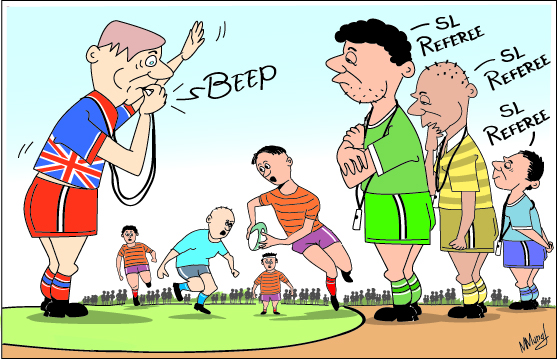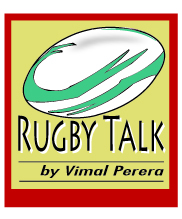Did we fail to plan or did we plan to fail ?
View(s):Earlier this week a sports page of a local English daily carried a story under the hedline: “No local referees for Carlton International 7s”. Some were happy at the development and predicament faced by the local referee’s society. This is nothing new as during the last club season referees were brought down by the controlling body at various times and the knockout featured an almost 100 % of foreign referees. Some were skeptical as this may not augur well as referees are needed for game to move forward. A veteran rugby player, administrator and referee asked” “If the referees don’t get the exposure in Sri Lanka where will they get it from?”. Probably they will have to be exported to the Middle East quipped another.
In his inaugural address in 1961 the former President of the United States John F. Kennedy said, “And so, my fellow Americans: ask not what your country can do for you – ask what you can do for your country”. Considering the fact that the top level games that are officiated by foreign referees constitute less than 10% of all games in Sri Lanka what will be the position of rugby in its entirety if the local referees are not made use of?. To put in figures there are around 600 games other than the top games that are played in the country.
Is it the time that you ask yourself what we can do to the referees society without harping on what should the referees society should do. One problem is that lack of people joining the society! Would the schools encourage the boys leaving school who will not continue to play to take to the whistle? In most countries most referees start young as this is considered another path in rugby. In England there are many under the age of 20 who take to the whistle and progress. Wayne Barnes started to referee at 15 and joined panels of the national referees at the age of 21. He went on to the IRB Rugby World Cup at the age of 28 years.
 Try doing this in Sri Lanka. The same voices may ask what rugby have you played and damage the ego of the man who has taken that chance to referee. Who really is to be blamed is a question the doubting individuals should ask and probably do so in front of a mirror.
Try doing this in Sri Lanka. The same voices may ask what rugby have you played and damage the ego of the man who has taken that chance to referee. Who really is to be blamed is a question the doubting individuals should ask and probably do so in front of a mirror.
Recently during an Under-14 schools tournament there was an altercation about refereeing between a coach of an elite school and a young cramped referee. In the course of exchanging words the referee, it is alleged, asked, “Who are you?” Meaning in what capacity are you asking questions? This led to an assertion” “I am a legend you are nothing.” My question is not the right of anybody to claim to be a legend but the logical conflict that will follow with less understanding between two vibrant requirements as the game goes forward. The country needs coaches as well as referees and without mutual respect and understanding the game will reach a dead end. Please tell me we need foreign referees for the junior games too.
Words are sometimes misleading and spoken haphazardly gets you nowhere. Just as I can call myself a “Gentleman” but in reality it depends on how others perceive. The meaning of a legend as a noun refers to “a traditional story sometimes popularly regarded as historical but not authenticated; such as the legend of King Arthur”. Or can be used to describe “as an extremely famous or notorious person, especially in a particular field. Used as an adjective it means; “very well known”. Saradiel as well as Robin Hood were known to be heroes as well as bandits went unto become legends.
Last week I witnessed a club Division II Sevens tournament dominated mostly be teams from the Forces. The point here is not the domination of the Forces but the fact that the teams consisted of players most of whom are from the outstations learning the basics of rugby the hard way. In this lot were teams from Wariyapola, Gampaha and Modera, a town closer to the city. Some among these boys had talent and they were strong. There were no big names among the coaches who trained these teams. What was good was the spirit in which the games were played and the behavioural pattern of the coaches who were an example to those who came under their charge.
The custodians of rugby are a new generation of heirs to a second and third generation and aspiring to be in the fourth generation. The torch is being passed to an age group which may not be necessarily the elitist rugby-playing schools as witnessed in the field of cricket. The question what values of the game — are we leaving to them and if to be remembered as legends? “Bandits or Heroes?” The national team returned from the Commonwealth Games in Scotland last week and after a rest of around a week most players will play in the two legs of the Carlton International Sevens. Then the national team will fly to play the Asian Sevens circuit first round in Hong Kong on August 23 and then to Malaysia for the second round on September 6. The Asian Games will follow on the September 30. There is a full table of Sevens that we are more skillful in. The question is the duration in which so many Sevens are played. Did we fail to plan or did we plan to fail?
* Vimal Perera is a former Rugby Referee, coach and Accredited Referees Evaluator IRB


